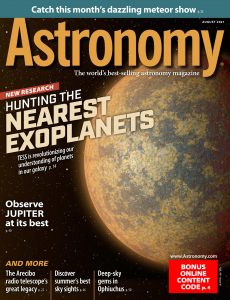
Astronomy – August 2021
English | 74 pages | pdf | 42.47 MB
The exoplanet explosion
In 1992, a discovery rocked the astronomy world when astronomers found a planet orbiting a pulsar in the Milky Way Galaxy. It was the first planet discovered outside our own solar system. Technology and emerging, clever techniques were on parallel tracks to give us immense new insight into the galaxy around us. Thirty years after the initial discovery, we now know of more than 4,700 extrasolar planets in nearly 3,500 different systems.
None of this is really surprising. The conventional wisdom about how stars form suggests that a disk of debris — of planets and small bodies like asteroids and comets — should be commonplace, if not universal. It is comforting to know that thousands of stars relatively near us in the Milky Way have their own planetary systems.
However, despite the exaggerations of the many press releases of past months and years, we have not found “another Earth” as yet.
But the searches continue at an accelerating pace. The business of exoplanet discovery is now a full-on cottage industry of its own.
The workhorse instrument in the search has been the Kepler Space Telescope, which launched in 2009 and operated until 2018. Astronomers used Kepler to detect many hundreds of exoplanets, despite the fact that its primary search area was limited to a 100° square of sky toward the constellations Cygnus and Lyra. Kepler’s successor, if you will, the Transiting Exoplanet Survey Satellite (TESS), was launched in 2018 and has already detected more than 2,600 exoplanet candidates. Its search area is about 400 times larger than that of Kepler, and it focuses on surveying the brightest stars near Earth.
In this issue, MIT’s George Ricker, the principal investigator of TESS, describes the science behind the mission and its exciting discoveries to date (page 14). This behind-the-scenes look by the mission’s leader will give you the most current glimpse of the state of exoplanet research and the many exciting paths it will take over the coming days and years.
Yours truly,
David J. Eicher
Download from: